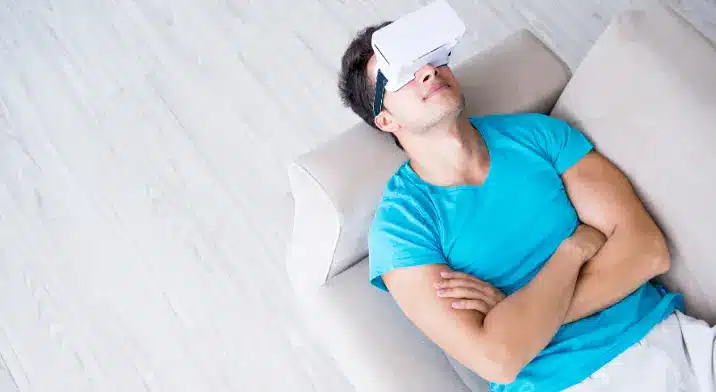
This is what University of Newcastle and HMRI Psychiatry PhD candidate, Rita Hitching, is hoping to find out.
Rita, who is a Stanford University alumnus, has extensive experience using virtual reality (VR) to help US veterans with post-traumatic stress disorder (PTSD). She says she is hoping that VR will help participants in her study access the calming benefits of mindfulness.
“VR is not just for gaming. It’s also a prescription digital therapeutic (PDT) device, funded under NDIS.” she says.
In America and Australia, PDT devices are approved by the FDA and TGA for the treatment of chronic pain and substance abuse.
Companies like XR Health are using it to help Australian children with autism and EngageVR. SilverVR has partnered with Dementia Australia to help us understand what it’s like to be living with dementia.
Rita was part of a team in California at the National Center for PTSD using VR to veterans with traumatic brain injuries and PTSD rebuild their lives.
“Prolonged exposure (PE) therapy is the most effective treatment for PTSD, but it requires the ability to be able to remember and visualize where the trauma happened. One of the many consequences of PTSD is impaired cognitive ability. Not just memory and attention, but also imagination. VR enabled us to simulate the environment where the traumatic experience happened, whether it was in Afghanistan or Iraq while driving a tank or during hand-to-hand combat, making treatment faster and more effective. This work is urgently needed. In the States, 22 combat personnel take their life every day because of PTSD.”
Rita is now investigating the potential of VR to treat insomnia. Rita says “VR is a powerful tool. It’s been shown to facilitate the delivery of evidence-based treatments including mindfulness for people of all ages with chronic pain, cancer, depression, anxiety, and of course PTSD who often have difficulty sleeping.”
Her world-first clinical trial of at-home VR mindfulness runs over four weeks and participants are asked to do two 15-minute VR sessions per week. Participants are surveyed before and after, and then followed up 4 weeks later to check in on the longevity of the effects. Rita says, “My hope is that VR will facilitate the adoption and adherence of mindfulness.”
Associate Professor Lisa Lampe is supervising Rita’s research and says, “Mindfulness is suitable for everyone and especially helpful for those who struggle to silence the mental chatter preventing them from falling asleep or getting back to sleep.“
The consequences of prolonged insomnia are severe and include an increased risk of depression, and anxiety as well as Type 2 diabetes, Parkinson’s Disease, and dementia.
“Many people don’t have access to or benefit from the currently available treatments. If this works, it is easily clinically transferrable. VR headsets are about $300, and you can download the app,” says A/Professor Lisa Lampe.
The trial is open to Hunter and New England residents aged 18 – 80 who have had difficulty falling or staying asleep or who have been dissatisfied with the quality of their sleep for more than 3 months and are interested in trying VR-delivered mindfulness.
HMRI would like to acknowledge the Traditional Custodians of the land on which we work and live, the Awabakal and Worimi peoples, and pay our respects to Elders past and present. We recognise and respect their cultural heritage and beliefs and their continued connection to their land.
Hunter Medical Research Institute
We’re taking healthy further.
Locked Bag 1000
New Lambton
NSW, Australia, 2305


This site is protected by reCAPTCHA and the Google Privacy Policy and Terms of Service apply.
Copyright © 2024 Hunter Medical Research Institute | ABN: 27 081 436 919
Site by Marlin Communications
